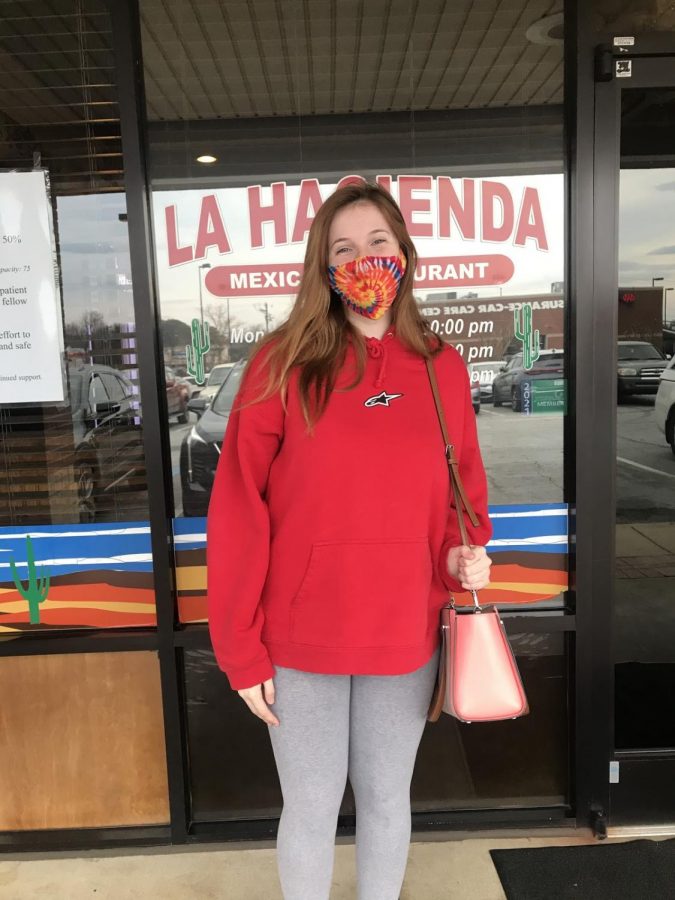Food for thought: Eating out in the midst of a pandemic
Victoria Anglin picking up food at La Hacienda restaurant.
Every time Victoria Anglin goes out to eat, she has to weigh her options. Where does she want to go? Should she dine in or get takeout? How much money is she willing to spend? But most importantly, is the restaurant she wants to go to COVID-safe?
In 2019, the decision to eat out consisted of one question: where do you want to go? Now, in the midst of a pandemic, people have to consider both safety and their stomachs when deciding to eat at a restaurant.
Anglin, a first year student, loves eating out. Whether she dines in or takes out, she loves to get out of her house or her dorm room and eat something besides food from her kitchen or the cafeteria. Before the pandemic began, Anglin and her family would go out to eat once or twice a week. However once the pandemic began, her family stopped going out and mostly stayed home to try new recipes.
“My mom and I were nervous to go out (when the pandemic began),” Anglin said. “Going out and being around strangers didn’t seem like the first thing we wanted to do.”
Anglin’s sentiments were echoed by Avery Edwards, a sophomore here at Guilford. With the dawn of the pandemic, Edwards’s already infrequent dining out became nonexistent as her family quarantined at their house.
According to Edwards, eating out during 2020 was nerve-wracking.
“You don’t want to be around people you don’t know (during a pandemic). You don’t know their habits; they could have COVID, for all you know.”
Even now, a year into the COVID-19 pandemic, most people still don’t feel comfortable eating in restaurants and prefer getting takeout above anything else. Since the pandemic began, many have preferred to get takeout or delivery. As a result, many restaurants that had never done takeout before began to offer takeout to maintain revenue and keep their customers.
Delaney Nightingale, a sophomore student from New Hampshire, is a server, hostess and occasional cook at Polly’s Pancake Parlor in Sweet Hill, NH. Before March 2020, Polly’s had never offered takeout, as they were always too busy in the restaurant itself. However, for their reopening in June 2020, they created a dedicated takeout menu for those who weren’t comfortable sitting in the restaurant to eat.
A takeout menu isn’t the only measure Polly’s took to reopen during the pandemic. The employees are now required to go through a COVID screening each morning before beginning work, consisting of a symptom review and a temperature check. All of the employees are required to wear masks, as are the patrons until they are seated and begin eating.
Inside the restaurant, they removed tables to allow for social distancing within the restaurant and to decrease the amount of people who could eat inside at one time. Polly’s enhanced their cleaning protocols to ensure that all tables and chairs were sanitized between patrons. Going a step further, each patron who came to eat in the restaurant was required to leave their name and phone number so that Polly’s could do contact tracing if any COVID cases were discovered.
Polly’s extensive COVID-protocols did not go unnoticed by their patrons. Nightingale remembers several patrons coming up and praising how the restaurant handled the safety precautions.
Nightingale remembers that one couple commented, “This is one of the first restaurants we’ve been to since COVID began, but this is the first restaurant we’ve felt safe in.”
Nightingale was happy that Polly’s was open during the pandemic, but lamented the significant decrease of people eating in the restaurant. She explained that most restaurants gave their servers very low wages, so the bulk of a server’s income was their tips.
“Before COVID, I would walk away from a six to eight-hour shift with $300 in tips,” Nightingale said. “Now, I’m lucky to walk out with $80.”
Polly’s is one of the lucky restaurants that is able to remain open despite a significant decrease in customers. Many restaurants and other businesses closed during the pandemic, unable to withstand the turbulent times and decreased patronage.
Nightingale is a firm believer in supporting business in any way you can.
“In order for businesses to stay afloat they need income,” she said. “Because of COVID, so many restaurants are going under because people aren’t supporting them. If you can, buy food from restaurants. It’ll help more than you know and every restaurant needs a bit of help right now.”










